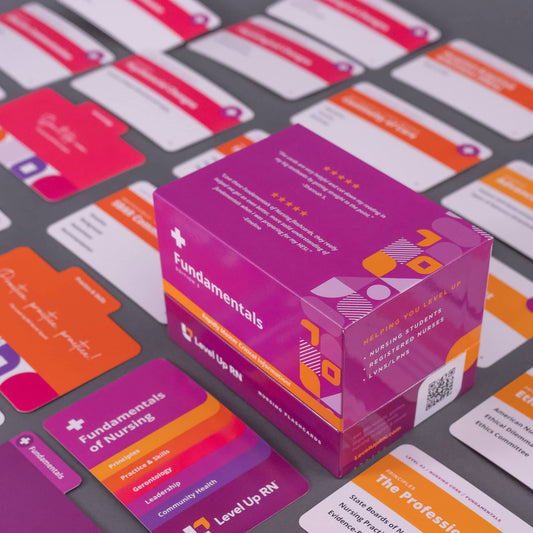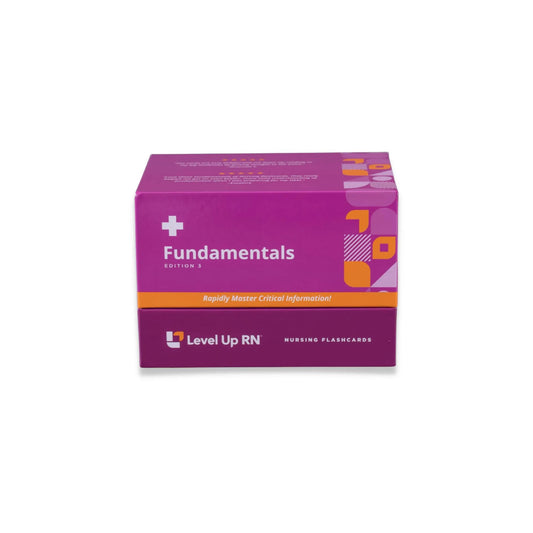Fundamentals - Gerontology, part 9: Alzheimer's / Parkinson's Disease
Updated: Ellis ParkerAlzheimer's disease, including the signs/symptoms, diagnosis, and nursing care.
Full Transcript: Fundamentals - Gerontology, part 9: Alzheimer's / Parkinson's Disease
Full Transcript: Fundamentals - Gerontology, part 9: Alzheimer's / Parkinson's Disease
Hi, I'm Ellis, and in this video, I'll be reviewing Parkinson's disease and Alzheimer's disease. These cards can be found in the gerontology section of our fundamentals flashcard deck. So if you have that deck, go ahead and grab these cards so then you can see what we have in red and bold on these cards, which are definitely things that you need to know. Parkinson's disease is a progressive neurodegenerative disease categorized by muscle rigidity, akinesia or akinesia, and involuntary tremor. So the main signs and symptoms are obviously, muscle rigidity, tremors, but also a slow and shuffling gait, postural instability, akinesia or akinesia, however you want to say that, which is a loss of movement or inability to move, but also bradykinesia or bradykinesia, which is a slowness in movement, meaning they just move very slowly. Other signs include a mask-like expression, drooling, and dysphagia. A cool chicken hint for you to remember the symptoms of Parkinson's is just the word trap. So trap means tremor, rigidity, akinesia or bradykinesia, and postural instability. Parkinson's is diagnosed based on the symptom review and ruling out other causes for the symptoms that that patient is experiencing.
A lot of the nursing care is going to revolve around safety while eating, right? Because they have a higher incidence of dysphagia, the nursing care is going to involve monitoring their swallowing and intake, perhaps using a thickener to thicken the food or liquids that they're intaking to prevent aspiration. We want to make sure our patient is sitting upright to eat, and that we have suction equipment available while they're eating just in case it's needed. We want to encourage these patients to participate in range of motion and exercise, but it is important to remember that part of our care is going to include a sustainment with ADLs because they might not be able to perform all of them as independently as they once did, and to make sure that we're following fall precautions.
Alzheimer's disease is a gradual, non-reversible dementia in which a person experiences memory problems, judgment issues, and personality changes. The signs and symptoms that one experiences with Alzheimer's disease will depend on what stage they're in. So stage one is more mild, and that's when people experience forgetfulness, a short-term memory loss. Stage two, which is more moderate, is when people start experiencing disorientation, agitation. They'll start requiring more assistance with ADLs or remembering to perform ADLs, remembering how to perform ADLs. They may experience incontinence, and they may experience wandering, so leaving their home or their facility or their room and perhaps getting lost or forgetting why they went there, forgetting where they are. The third stage of Alzheimer's disease, which is the more severe stage, is when a patient becomes bedridden. They might lose verbal and motor skills, so be unable to speak or respond coherently and move with intention and purpose. And they also experience impaired swallowing and dysphagia. To diagnose Alzheimer's, practitioners consider the symptoms they're experiencing. They also might employ memory tests like a Mini-Cog, and they ultimately rule out other conditions that might be causing these issues.
So nursing care for a patient with Alzheimer's ultimately includes structuring their environments and their routines. So when I'm working with an Alzheimer-- a patient with Alzheimer's, excuse me, I want to provide short directions that are kind of to the point. It might mean that we need to use repetition and reorient somebody to what we're doing and maybe where we are or who we are. We want to avoid overstimulation. So use a single day calendar could be helpful because then they're not thinking about a lot of things all at once and more of just like what do we need to focus on right now or for today? We also need to be considerate of making sure their environment is secure, and that might include locking or blocking access to stairs or doors or exits because of that tendency to wander. We don't want them to leave a premises and become at risk of injury or getting lost or harm. We also should definitely make sure we're implementing fall precautions to keep these patients safe. Something that is special with Alzheimer's patients is sundowning. Sundowning occurs when a patient becomes more confused or agitated in the evening. So perhaps they are more cognizant during the day, maybe they experienced better memory and they're less agitated, but as the night progresses, they might become a little bit more confused and more agitated.
Define Parkinson's disease. Parkinson's disease is a progressive neurodegenerative disease. Now, name at least three symptoms that may be exhibited in a patient who is experiencing Parkinson's disease. This is where we have that cool chicken: trap. So symptoms of Parkinson's disease are going to include tremors, rigidity, akinesia or akinesia, and postural instability. So these patients are also going to exhibit slow and/or shuffling gait. They might have a mask-like expression, drooling, or dysphagia. What are two nursing interventions that you can do when working with a patient who is experiencing dysphagia? Interventions include monitoring their intake and swallowing, thickening their food and liquids as appropriate, having the patient and assisting them in sitting upright to eat, and to make sure that suction equipment is available if necessary. Define Alzheimer's. Alzheimer's disease is characterized by a gradual non-reversible dementia that usually results in memory problems, judgment issues, and personality changes. Name at least two signs of stage two Alzheimer's disease. Stage two signs include disorientation, agitation, requiring assistance with ADLs, incontinence, and wandering. Define sundowning. Sundowning is increased confusion or agitation in the evenings.


